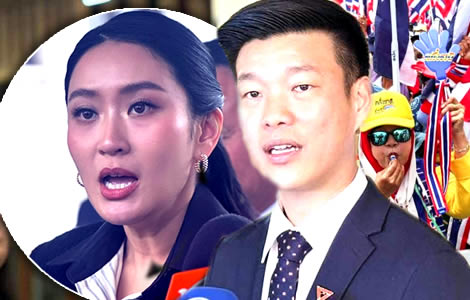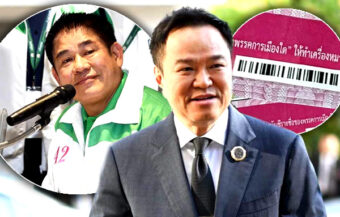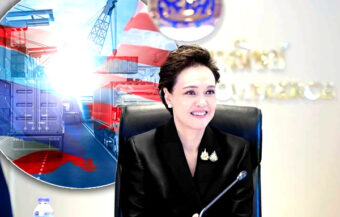Teng blasts PM Paetongtarn over leaked Hun Sen call, blaming her for fuelling crisis. He warns against coup talk as polls show surging People’s Party support. With a court ruling looming, Paetongtarn admits nerves while protests and political tension rise.
On Monday, People’s Party leader Nattapong Ruangpanyawut or ‘Teng” tore into Prime Minister Paetongtarn Shinawatra, slamming her government’s failed communications as the spark behind Thailand’s escalating political crisis. The 38-year-old head of the country’s most popular party didn’t hold back—especially on talk of street protests and coups. His warning came after both the People’s Party and ruling Pheu Thai condemned veiled calls for a coup at Saturday’s Bangkok rally. Nattapong told supporters to reject any push for undemocratic shortcuts, calling them reckless and dangerous. Meanwhile, a visibly shaken Paetongtarn admitted she’s “nervous” ahead of Tuesday’s Constitutional Court hearing—one that could spell the end of her premiership.

Following a dramatic shift in public opinion, Thailand’s political landscape has changed in the last two weeks. It follows the crisis unleashed by an explosive audio clip. The People’s Party, led by Nattapong Ruangpanyawut, now commands the support of 46.08% of voters. Additionally, 31.48% of the electorate believe Nattapong should be the next Prime Minister. That is according to the authoritative National Institute of Development Administration (NIDA) quarterly poll published Sunday.
These numbers reflect a significant decline in public confidence in the current government. Meanwhile, Prime Minister Paetongtarn Shinawatra faces an escalating crisis. The leaked audio recording has put her in political jeopardy.
Audio leak scandal triggers court petition and plunges Prime Minister Paetongtarn into deeper crisis
In the recording, she can be heard speaking with Cambodian Senate President Hun Sen on June 15. The controversial call sparked public outrage and led to accusations of misconduct. As a result, the Constitutional Court will meet on Tuesday to decide whether to accept a petition from the Senate.
The petition seeks Paetongtarn’s removal based on the leaked conversation. In response to the backlash, Paetongtarn made a public apology. She directly addressed both the commander of the 2nd Army and the Thai people.
Nevertheless, her explanation has done little to calm public dissatisfaction. In fact, trust in her leadership has visibly eroded since the clip’s release. Moreover, the Prime Minister reshuffled her cabinet in a move seen as strategic damage control.
Notably, she appointed herself as Minister of Culture. This decision raised eyebrows and intensified speculation about her political future. However, critics argue this reshuffle is a preemptive step before a potential suspension.
Nattapong rejects coup rhetoric and calls for peaceful resistance to democratic backsliding in Thailand
Paetongtarn, on the other hand, claims she took the post to strengthen Thailand’s cultural presence globally.
Despite the turmoil, Nattapong has remained clear on one point: he rejects any undemocratic solutions.
On Monday, speaking in parliament, he warned supporters not to back military interventions. According to him, some protest leaders are subtly leaving the door open to a coup.
He emphasized that while many demonstrators act with good intentions, their leaders might exploit the unrest. These figures, Nattapong said, were involved in past movements that eventually led to coups.
Therefore, he urged caution.
“Thailand must not return to the cycle of military rule,” he declared. “We must resist repeating historical mistakes.”
People’s Party urges legal options as Nattapong denounces Paetongtarn’s handling of foreign diplomacy
Nattapong stressed that legal, democratic means exist to remove the prime minister. These include voluntary resignation, impeachment or dissolving parliament for new elections. Accordingly, the People’s Party has officially called for the House to be dissolved.
They believe the people must decide Thailand’s direction, not the courts or the military. At the same time, Nattapong raised concerns about foreign relations. He pointed to repeated failures in communicating with Cambodia.
He argued that Paetongtarn relied too heavily on personal or family ties in diplomacy.
Consequently, he believes this allowed Hun Sen to control the narrative and damage Thailand’s credibility. He said the country’s diplomacy should be conducted through institutional channels, not informal networks.
Meanwhile, rumours are spreading about possible successors. Some circles suggest appointing an outsider prime minister in case of Paetongtarn’s removal.
Nattapong opposes unelected leaders and warns the public not to fall for old authoritarian tactics again
However, Nattapong strongly opposed this idea. He argued that installing an unelected leader would be just as damaging as a coup.
He confirmed that the People’s Party is studying all legal options, including using Section 151 for a no-confidence vote. In doing so, they aim to respond within the legal framework and avoid instability.
Asked about former Prime Minister General Prayut Chan-o-cha’s appearance in recent polls, Nattapong was blunt. Prayut ranked third, but Nattapong sees this as a warning sign.
It reflects deep public frustration, and not renewed support for military figures. He warned the public against falling for populism tied to authoritarian legacies.
“We must look ahead,” he said, “not backwards.”
Still, Paetongtarn has tried to maintain composure. Speaking at Government House on Monday, she admitted being nervous about the court ruling. Yet she claimed her main focus remains on governing effectively.
Paetongtarn says ministerial shift promotes culture but growing protest calls for resignation intensify
According to her, becoming Minister of Culture is not a political shield. Rather, she sees it as a mission to promote Thailand’s soft power. The Culture Ministry, she argued, plays a critical role in shaping the national image. She insisted this was her sole motivation for accepting the post.
When asked about the protests, Paetongtarn expressed understanding. She said peaceful assembly is a democratic right. Nonetheless, she hopes the demonstrations will not derail critical government work, including foreign negotiations.
Despite her words, internal government tension is rising. Her conversation with Hun Sen has embarrassed Thailand on the world stage. It has also fueled calls for her resignation, especially from pro-democracy groups.
The Campaign for Popular Democracy, which includes fifteen civic organizations, issued a bold statement on Monday. They called for Paetongtarn to resign voluntarily. Simultaneously, they warned against any coup attempt.
Parliament unrest and internal party directives show a widening rift in Thailand’s democratic struggle
Such actions, they said, would tarnish Thailand’s democratic reputation. Cracks are also forming inside parliament. The Bhumjaithai Party, now formally in the opposition, is thought to be manoeuvring for power.
Allegedly, they may nominate a candidate for second deputy speaker of the House. If successful, such a move could legally reclassify them as part of the government bloc. This shift would influence future amendments to the constitution.
Nattapong called the manoeuvre dangerous and warned it could create legal complications. He stressed that every party must act transparently and respect the will of voters. In addition, the People’s Party issued a strict internal directive.
On Monday, Secretary-General Sarayut Jailak reminded members of the party’s core values. He warned them not to support military force or cross party lines for personal gain. Unity and adherence to democratic norms, he said, were paramount.
Tensions remain high. The divide between democratic forces and those with extra-constitutional ambitions is growing clearer each day. Nattapong again warned that some protesters may be manipulated by old political players.
He argued the country cannot afford another round of elite-engineered disruption. According to him, the public must remain alert and reject shortcuts to power. He also addressed Thailand’s poor handling of regional diplomacy.
As court ruling looms, both camps brace for fallout while economic and political futures hang in balance
The Prime Minister’s failure to establish clear diplomatic procedures, he said, has put the country in a weak position. Though he denied that Cambodia benefits from Thailand’s crisis, he acknowledged that the bilateral relationship is fraying.
With the Constitutional Court’s decision looming, both camps appear tense and uncertain. Paetongtarn insists she will not step down unless legally required. Despite falling popularity, she says she remains committed to her responsibilities.
Her allies argue that the court case is politically motivated and urge patience. Meanwhile, Nattapong is preparing his party for every possible outcome. He particularly reminded members that popularity is fleeting.
Opinion shows Prime Minister Paetongtarn finished with the public. Huge support for the People’s Party
Bangkok protest passes off with no overnight camp. Meanwhile, the PM prepares for July 1st court date
Hun Sen’s mask falls. Speech on Friday clearly showed deliberate ill will to collapse Thailand’s democracy
“Only those who stick to principles and serve the people consistently,” he said, “will endure.”
In the days ahead, Thailand stands at yet another political crossroads. Indeed there may be many yet ahead.
What happens next, or even on Tuesday, will certainly be another milestone in Thailand’s struggle to find political stability and effective democratic governance.
Notably, it is a country already faced with a faltering economy and chronic structural problems. It badly needs a stable government with long-term goals and foresight. What it has right now could not be further removed from what is required.


















